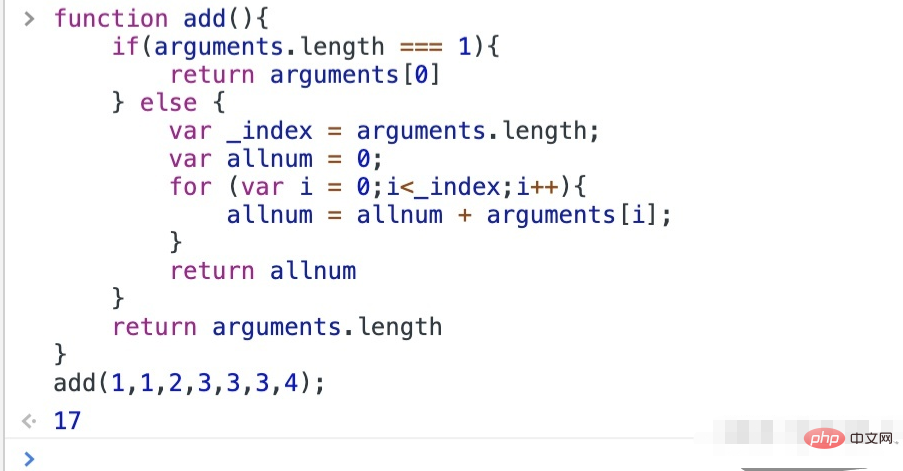Does javascript have function overloading?
Javascript does not have function overloading. Functions with the same name and different parameters are called overloading. Function overloading cannot be implemented in JavaScript because if there are functions with the same name, the later ones will overwrite the previous ones.

The operating environment of this tutorial: windows7 system, javascript version 1.8.5, Dell G3 computer.
javascript does not have function overloading
First describe the definition of overloading: functions with the same name and different parameters are called overloading.
That is, there are functions with the same name in the program, and different calls of the same function can be realized through parameter judgment.
And JavaScript cannot implement function overloading, because for functions with the same name, the later ones will overwrite the previous ones.
JS-defined functions are identified by function names, and are matched with the parameters passed in according to the defined parameter order. Any excess will be discarded, and any insufficient will be treated as undefined.
But js also has its own method to implement overloading, which is method overloading. By judging the number of parameters, method overloading is implemented inside the function.
For example, when the function receives one parameter, it returns the current parameter. If there are two, it returns the sum of the two parameters. If there are three, it returns the sum of the three functions. And so on...
function add(){
if(arguments.length === 1){
return arguments[0]
} else {
var _index = arguments.length;
var allnum = 0;
for (var i = 0;i<_index;i++){
allnum = allnum + arguments[i];
}
return allnum
}
return arguments.length
}
add(1,1,2,3,3,3,4);
[Related recommendations: javascript learning tutorial]
The above is the detailed content of Does javascript have function overloading?. For more information, please follow other related articles on the PHP Chinese website!

Hot AI Tools

Undresser.AI Undress
AI-powered app for creating realistic nude photos

AI Clothes Remover
Online AI tool for removing clothes from photos.

Undress AI Tool
Undress images for free

Clothoff.io
AI clothes remover

Video Face Swap
Swap faces in any video effortlessly with our completely free AI face swap tool!

Hot Article

Hot Tools

Notepad++7.3.1
Easy-to-use and free code editor

SublimeText3 Chinese version
Chinese version, very easy to use

Zend Studio 13.0.1
Powerful PHP integrated development environment

Dreamweaver CS6
Visual web development tools

SublimeText3 Mac version
God-level code editing software (SublimeText3)

Hot Topics
 1386
1386
 52
52
 How to distinguish function overloading and rewriting in C++
Apr 19, 2024 pm 04:21 PM
How to distinguish function overloading and rewriting in C++
Apr 19, 2024 pm 04:21 PM
Function overloading allows functions with the same name but different signatures in a class, while function overriding occurs in a derived class when it overrides a function with the same signature in the base class, providing different behavior.
 Simple JavaScript Tutorial: How to Get HTTP Status Code
Jan 05, 2024 pm 06:08 PM
Simple JavaScript Tutorial: How to Get HTTP Status Code
Jan 05, 2024 pm 06:08 PM
JavaScript tutorial: How to get HTTP status code, specific code examples are required. Preface: In web development, data interaction with the server is often involved. When communicating with the server, we often need to obtain the returned HTTP status code to determine whether the operation is successful, and perform corresponding processing based on different status codes. This article will teach you how to use JavaScript to obtain HTTP status codes and provide some practical code examples. Using XMLHttpRequest
 Overloading and rewriting of PHP functions
Apr 26, 2024 pm 05:12 PM
Overloading and rewriting of PHP functions
Apr 26, 2024 pm 05:12 PM
Function overloading and rewriting are supported in PHP to create flexible and reusable code. Function overloading: allows the creation of functions with the same name but different parameters, and calls the most appropriate function based on parameter matching. Function rewriting: Allow subclasses to define functions with the same name and override parent class methods. When subclass methods are called, they will override parent class methods.
 How to implement function overloading in golang?
Apr 29, 2024 pm 05:21 PM
How to implement function overloading in golang?
Apr 29, 2024 pm 05:21 PM
The Go language does not support traditional function overloading, but similar effects can be achieved through the following methods: using named functions: creating unique names for functions with different parameters or return types; using generics (Go1.18 and above): creating unique names for different types of parameters A single version of the function.
 Best practices for C++ function overloading
Apr 20, 2024 am 10:48 AM
Best practices for C++ function overloading
Apr 20, 2024 am 10:48 AM
Best practices for C++ function overloading: 1. Use clear and meaningful names; 2. Avoid too many overloads; 3. Consider default parameters; 4. Keep the parameter order consistent; 5. Use SFINAE.
 Does C++ function overloading apply to constructors and destructors?
Apr 14, 2024 am 09:03 AM
Does C++ function overloading apply to constructors and destructors?
Apr 14, 2024 am 09:03 AM
C++ constructors support overloading, but destructors do not. Constructors can have different parameter lists, while destructors can only have an empty parameter list because it is automatically called when destroying a class instance without input parameters.
 Why is there no function overloading in golang?
Apr 30, 2024 am 10:54 AM
Why is there no function overloading in golang?
Apr 30, 2024 am 10:54 AM
Function overloading is not allowed in the Go language for the following reasons: Simplify the compiler implementation Improve code readability and avoid name conflicts In Go, you can use variable parameter lists or interfaces to achieve behavior similar to function overloading.
 What are the application scenarios of C++ function overloading in actual projects?
Apr 26, 2024 pm 01:57 PM
What are the application scenarios of C++ function overloading in actual projects?
Apr 26, 2024 pm 01:57 PM
Function overloading allows functions with the same name to be defined differently in C++, handle different types of arguments, or perform different operations. Specific application scenarios include: processing different data types to provide different functions to improve code readability




